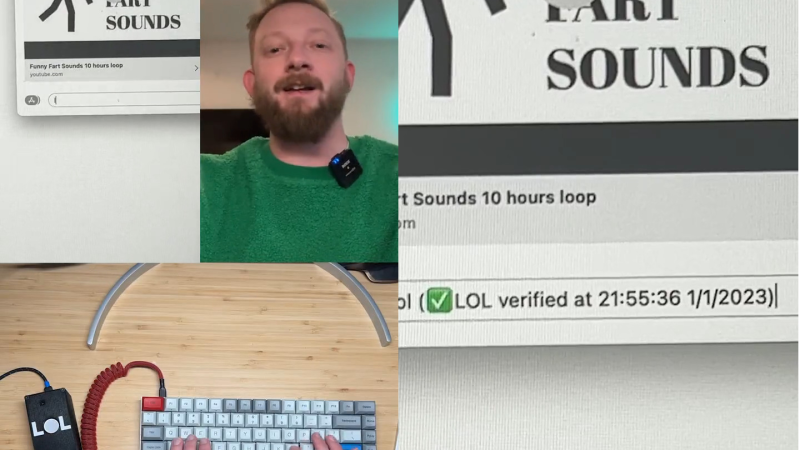There was a time not too long ago when “LOL” actually meant something online. If someone went through the trouble of putting LOL into an email or text, you could be sure they were actually LOL-ing while they were typing — it was part of the social compact that made the Internet such a wholesome and inviting place. But no more — LOL has been reduced to a mere punctuation mark, with no guarantee that the sender was actually laughing, chuckling, chortling, or even snickering. What have we become?
To put an end to this madness, [Brian Moore] has come up with the LOL verifier. Like darn near every project we see these days, it uses a machine learning algorithm — EdgeImpulse in this case. It detects a laugh by comparing audio input against an exhaustive model of [Brian]’s jocular outbursts — he says it took nearly three full minutes to collect the training set. A Teensy 4.1 takes care of HID duties; if a typed “LOL” correlates to some variety of laugh, the initialism is verified with a time and date stamp. If your LOL was judged insincere – well, that’s on you. See what you think of the short video below — we genuinely LOL’d. And while we’re looking forward to a ROTFL verifier, we’re not sure we want to see his take on LMAO.
Hats off to [Brian] for his attempt to enforce some kind of standards online. You may recall his earlier attempt to make leaving Zoom calls a little less awkward, which we also appreciate.
I made this thing called LOL Verifier: a device that only lets you type lol if you’ve actually laughed out loud pic.twitter.com/Gsc63yGEm0
— Brian Moore (@lanewinfield) January 3, 2023
















The next step would be an automatic emotion logger with a timeline and a “share emotion event” approval function, you could even have access control for your emotions with some people seeing the full stream rather than the one that you filter, or perhaps a biased substream that is weighted, positive/negative emotions etc. A form of “Internet of Emotions”, IoE.
HAHAHA
https://www.youtube.com/watch?v=2Sg9YYAVj9g
Spergiest thing I’ve ever heard
LOL, but that is a legitimate use-case!
neckbeard – n. One who possesses the ability to be upset by the majority using language differently than themselves
One is not amused by this Totally Serious Project, I take it :-) lol
Lol
When I write “LOL” (except right now), I really did laugh out loud, even if it was 1 “Ha!”.
Some of us still believe in personal integrity.
B^)
And ROFLMAO, was that real too?
Actually LOL used to stand for LOTS OF LOVE. It got hijacked in the early days of the sms messaging.
EMPLOYEE No. 3876, YOUR EMPLOYER HAS TOLD A JOKE. YOU MUST LAUGH.
LAUGH INSINCERE. TRY AGAIN OR BE DOCKED 30 CREDITS.
@Jim Why do you say such nonsense? LOL was used decades before SMS was invented and in fact was first used as the familiar LOL and only later used by some non-tech folks as LotsOfLove.
Oh and while on the subject: GG stands for ‘Good Going’ not ‘Good Game’ like some gamers confused it for when they saw it.
And the plural for computer mouse used to be ‘mouses’ but was later normalized to ‘mice’.
Meeses